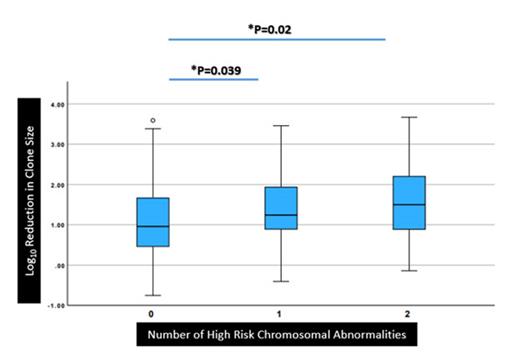Background
Measurable residual disease (MRD) is a quantitative, dynamic prognostic marker of progression free and overall survival in MM. With modern triplet and quadruplet induction strategies deep responses are the norm and the incremental effect of ASCT impact may vary substantially among pts and be influenced by disease and treatment features. However, the accurate characterization of the impact of ASCT is diluted by measuring a disease surrogate (paraprotein) instead of clone size. We examine the quantitative impact of ASCT on MM clone size by serial NGS testing before and after ASCT and evaluate disease and induction treatment features that modulate this impact.
Methods
We included pts with newly diagnosed MM from five US centers, who received modern triplet and quadruplet induction followed by single melphalan ASCT between 3/2018 and 5/2023 with MRD testing (ClonoSEQ®) pre and post ASCT. ClonoSEQ® platform utilizes NGS to quantify unique immunoglobulin genes rearrangements associated with MM clone, therefore directly capturing clone size. We excluded pts with clone size <10 -5 prior to ASCT. We explored patient-, disease-, and treatment features influencing clone size reduction with AHCT by 1 log 10. We used binary logistic regression to identify factors associated with ≥1 log 10 clone reduction (60-100 days post ASCT).
Results
One hundred and forty-nine pts with NDMM had pre and post ASCT results and pre ASCT MRD ≥10 -5 and met the inclusion criteria. The median age was 63 years (35-79), 37 pts (25%) ≥70 years, 62% male, 27% Black, 23% ISS3 and 16% RISS3. Seventy-three pts (49%) had high risk chromosomal abnormalities [HRCA, gain/amp(1q), t(4;14), t(14;16), t(14;20) or del(17p)]); 72 pts (48%) had 0 HRCA, 50 (34%) had 1 HRCA, and 23 (15%) had 2+ HRCA. AntiCD38 monoclonal antibody (mAb) was part of induction in 125 (84%) pts [68 pts quadruplet containing carfilzomib; 53 pts quadruplet containing bortezomib], 28 pts received triplets. Eighty-seven pts (58%) had >1log 10 reduction in MRD burden with ASCT. The median log reduction in MRD burden was 1.15 (IQR 0.65-1.75). For pts with 0, 1 and 2+ HRCA, 47% (34/72), 68% (34/50), 74% (17/23) had a >1 log 10 reduction in clone size and the median reduction was 0.96 log 10 (IQR 0.47-1.66), 1.24 log 10 (IQR 0.89-1.91) and 1.5 log 10 (IQR 0.89-2.20), respectively (Figure). Among pts without HRCA, those with hyperdiploid MM had a trend towards less frequent ≥1 log 10 clone size reduction with ASCT (38% vs. 57%, p=0.18). Overall, we saw reduction ≥1 log 10 in clone size in 61% of pts receiving anti-CD38 mAb in induction (N=125) vs. 46% among those who did not (N=24, p= 0.18). Among pts treated with melphalan 200 mg/m 2 (N=113) compared to those who received 140 mg/m 2 (N=36), ≥1 log 10 reduction in clone size was noted in 61% vs. 50% (p=0.25), respectively. In multivariable analysis that included stage, antiCD38 mAb in induction, use of carfilzomib in induction, HRCA and melphalan dose, the presence of HRCA was the only factor associated with greater than 1 log 10 reduction in MRD burden with ASCT [1 HRCA, OR 2.34 (1.07-5.14); ≥2 HRCA, OR 2.71 (0.91-8.03); p=0.049].
Conclusions
The impact of high dose melphalan and AHCT on MM clone size is heterogeneous, of greater magnitude in pts with one or more high-risk chromosome abnormalities, and less pronounced in pts with standard risk disease, particularly hyperdiploid MM. The use of antiCD38 mAb in induction regimens or dose of melphalan does not impact the effect of ASCT on MM clone size, likely owing to the distinct mechanism of action of melphalan. This dataset provides context to explore risk- and response-adapted use of ASCT and use of new cellular and non-cellular immunotherapies as post-induction consolidative strategies.
Disclosures
Costa:BMS: Consultancy, Honoraria, Research Funding; Amgen: Consultancy, Honoraria, Research Funding; Janssen: Consultancy, Honoraria, Research Funding; AbbVie: Honoraria, Research Funding; Pfizer: Consultancy, Honoraria; Genentech: Research Funding; Adaptive biotechnologies: Consultancy, Honoraria. Dhakal:Janssen, Karyopharm, GSK, Arcellx, GSK, Sanofi, Genentech, Pfizer: Consultancy, Honoraria, Speakers Bureau. Dholaria:Angiocrine: Research Funding; Poseida: Research Funding; Allovir: Research Funding; NCI: Research Funding; Orca Bio: Research Funding; Adicet: Research Funding; MEI: Research Funding; Pluri Biotech: Consultancy; AstraZeneca: Research Funding; Molecular Templates: Research Funding; Atara: Research Funding; Boxer Capital: Consultancy; Ellipsis pharma: Consultancy; Lumanity: Consultancy; Takeda: Research Funding; Arivan: Consultancy; ADC therapeutics: Consultancy, Honoraria; Gilead: Research Funding; Wugen: Research Funding; Pfizer: Research Funding; BEAM therapeutics: Consultancy; gamida cel: Consultancy; Janssen: Consultancy, Honoraria, Research Funding; BMS: Research Funding; Poseida: Research Funding. Bal:Adaptive Biotechnology: Consultancy; Beigene: Research Funding; Janssen: Consultancy; MJH Lifesciences: Other: Educational content development ; Bristol Myers Squibb: Consultancy; Amyloid Foundation: Research Funding; Astrazeneca: Consultancy; AbbVie: Consultancy; Fate Therapeutics: Research Funding.


This feature is available to Subscribers Only
Sign In or Create an Account Close Modal